Choosing the Best Cat Litter for Sphynx Cats
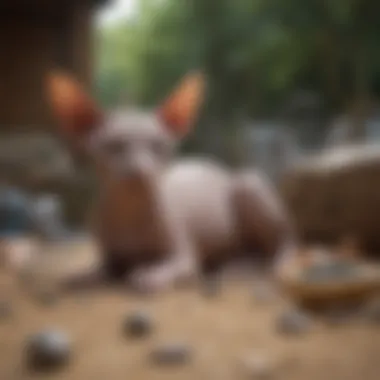
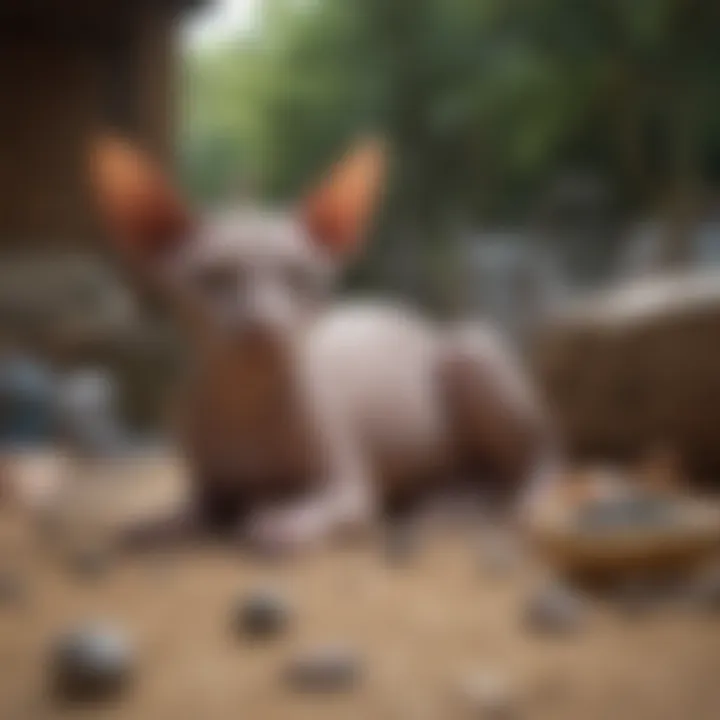
Intro
Sphynx cats are unique among feline breeds, known for their lack of fur and distinctive appearance. These charming creatures have specific preferences and needs, especially when it comes to litter selection. The choice of cat litter affects their hygiene, comfort, and overall health. As Sphynx cats have sensitive skin and are prone to certain health issues, understanding which cat litter suits them best is crucial for pet owners.
This article provides an in-depth exploration of various types of cat litter, examining their features and implications for Sphynx cats. Owners will find guidance on selecting the ideal litter by considering factors like texture, odor control, and the material’s impact on feline health. Ultimately, the aim is to create a comfortable and clean environment for these hairless companions.
Animal Overview
Common Names
Sphynx cats are often simply referred to as Sphynx or hairless cats. Their unique look and temperament have cultivated a dedicated following among feline enthusiasts.
Scientific Classification
The Sphynx is classified as follows:
- Kingdom: Animalia
- Phylum: Chordata
- Class: Mammalia
- Order: Carnivora
- Family: Felidae
- Genus: Felis
- Species: Felis catus
Geographic Range
Sphynx cats originated in Canada during the late 20th century. While their breeding is primarily seen in North America, they have gained popularity worldwide, appearing in homes across Europe and Asia. Their adaptability allows them to thrive in various environments, so long as their specific needs are met.
Behavior and Social Structure
Social Behavior
Sphynx cats are known for their friendly and outgoing temperament. They often seek human companionship and enjoy interacting with their owners. Their social nature makes them good pets in multi-pet households.
Communication
Sphynx cats communicate similarly to other cat breeds but often do so with more vocalization. They may express needs and desires through chirps, purrs, and meows, showcasing their lively personality.
Mating and Reproduction
Breeding Sphynx cats requires careful consideration due to health complications linked with their genetics. Responsible breeding practices can yield healthy kittens, but potential owners should be wary.
Habitat and Ecosystem
Natural Habitat
Although Sphynx cats do not have a specific natural habitat, they thrive in indoor environments where they feel safe and comfortable. They enjoy cozy spaces and require warmth due to their lack of fur.
Food Sources and Diet
As obligate carnivores, Sphynx cats require a diet rich in protein. Commercial cat food, specifically formulated for their needs, suits their nutritional requirements best. Owners should be diligent in providing a balanced diet to ensure a healthy lifestyle.
Role in Ecosystem
As domestic pets, Sphynx cats do not play a role in the wild ecosystem. Instead, they contribute to a household's ecosystem, providing companionship and engaging behaviors that enrich their owners’ lives.
It is essential to consider the specific requirements of Sphynx cats when selecting litter. This choice directly affects their comfort and health, influencing their overall well-being.
The unique qualities of Sphynx cats necessitate careful consideration of several factors when selecting litter. Understanding their behavior and needs provides a solid foundation for making the right choice to ensure the health and happiness of these extraordinary pets.
Preamble to Sphynx Cats
The Sphynx cat, known for its hairlessness and unique appearance, requires special consideration when it comes to litter selection. Understanding the intricacies of these cats is paramount for any Sphynx owner. This section delves into their distinctive physical and behavioral traits, which directly influence their litter preferences and overall hygiene needs. By recognizing these elements, pet owners can provide a comfortable and safe environment tailored to their Sphynx's specific needs.
Physical Characteristics
Sphynx cats are immediately recognizable due to their lack of fur, but their appearance goes beyond this defining feature. Their skin is often warm and slightly oily, necessitating a different approach to cleanliness and litter choice. Generally, these cats have a muscular build, coupled with a pronounced resemblance to other breeds, such as the Devon Rex or Cornish Rex.
The lack of fur means that Sphynx cats can be more susceptible to temperature fluctuations, prompting the necessity of a suitable litter type that supports their comfort as well. The skin's sensitivity also means that litter materials must avoid causing irritation. Protecting these unique physical traits while maintaining hygiene is essential.
Thus, the ideal litter for Sphynx cats should prioritize softness and skin-friendly properties.
Behavioral Traits
The behavior of Sphynx cats often reflects their intelligence and social nature. They are known to be affectionate and enjoy companionship, whether from humans or other pets. These traits influence how they interact with their litter box. Unlike some cats that prefer solitude for their bathroom habits, Sphynx cats might appreciate a more social setting.
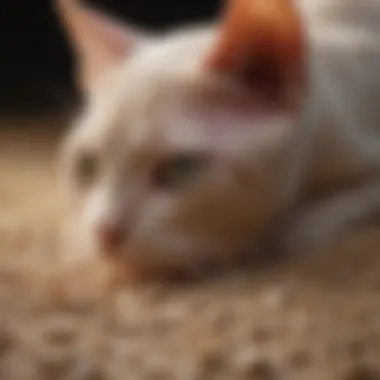
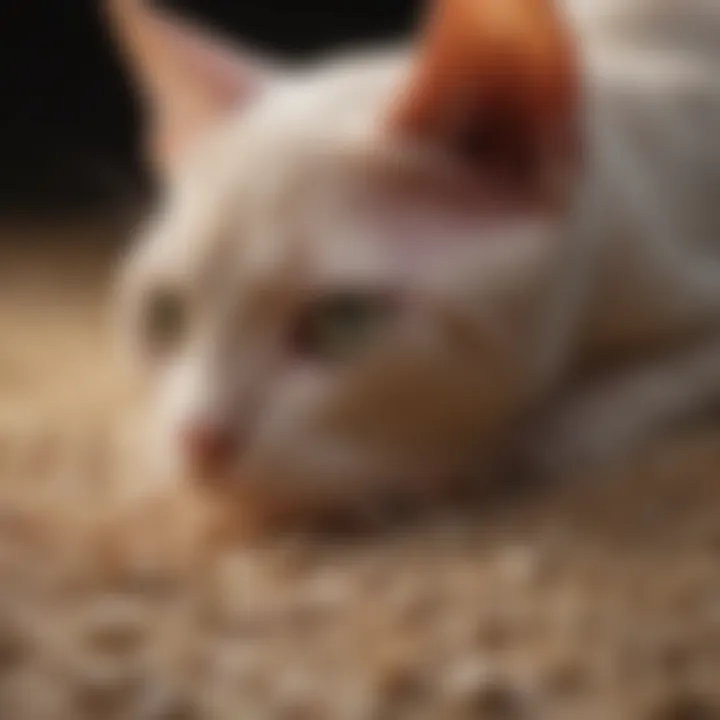
In addition, their inquisitive and playful nature means they might explore their litter box more vigorously than other cats. This can lead to litter being displaced, necessitating a choice of litter that does not create excessive mess. A litter that clumps well, for instance, could help alongside providing a clean area to work with.
Ultimately, recognizing these behavioral inclinations helps pet owners choose a litter that not only meets hygiene needs but also fits the lifestyle of these engaging cats.
Understanding Litter Needs for Sphynx Cats
Understanding the litter needs for Sphynx cats is critical for their overall well-being and comfort. These cats have distinct characteristics that necessitate careful attention to their litter box habits. Unlike other breeds, Sphynx cats have sensitive skin and specific preferences regarding texture. By recognizing these factors, pet owners can create an environment that is both hygienic and enjoyable for their pets.
Opting for the right cat litter can help address various concerns, including skin irritation, odor control, and general comfort when using the litter box. The aim is to provide a space where the Sphynx feels safe and clean, reducing the risk of litter box aversion, which can lead to behavioral issues.
Monitoring the litter type can influence their health, as Sphynx cats are prone to certain skin conditions aggravated by inappropriate litter materials. Therefore, understanding these needs is integral not only to cat care but also to maintaining a stress-free household.
Skin Sensitivity
Sphynx cats are renowned for their lack of fur, which makes their skin more susceptible to irritants. This characteristic plays a crucial role in the selection of cat litter. Many types of litter contain fragrances, dyes, or harsh chemicals that can cause allergic reactions or skin irritation in Sphynx cats.
When selecting litter, it is vital to pick a product that is free from these irritants. Natural and unscented litters are often recommended. The following points highlight the importance of skin sensitivity in litter selection:
- Avoiding irritants: Choose litter made from natural materials, such as corn or wheat, as these tend to be gentler on sensitive skin.
- Hypoallergenic options: Look for litters labeled hypoallergenic to minimize the risk of allergic reactions.
- Monitoring for reactions: If a Sphynx shows signs of skin irritation, such as redness or excessive grooming, it's essential to reassess the litter used.
By prioritizing skin sensitivity in the selection of cat litter, owners can help maintain the comfort and health of their Sphynx cats.
Preference for Texture
Texture plays a significant role for Sphynx cats when it comes to litter box use. Due to their velvety skin, these cats often have preferences for certain textures over others. Something that might seem trivial can greatly impact their willingness to use the litter box.
It's crucial to provide a litter texture that is comfortable for them. Finer granules may feel better on their paws than larger clumps. Also, a soft and smooth texture may be less likely to cause discomfort during use. Owners should consider the following when choosing litter based on texture:
- Trial and error: It can be beneficial to experiment with different litter types to determine which texture the Sphynx prefers.
- Avoiding rough textures: Litters with sharp edges or coarse granules can be unpleasant and may discourage use.
- Feedback from the cat: Observe any changes in behavior. If the cat seems hesitant, it might be worth trying another texture.
In summary, spending time understanding both skin sensitivity and texture preferences is vital when selecting litter for Sphynx cats. This attention to detail can lead to a more positive litter box experience and promote overall health.
Types of Cat Litter Available
Choosing the right cat litter is essential, especially for Sphynx cats, due to their unique needs. Their lack of fur can lead to different sensitivities and preferences regarding litter material. As a result, understanding the various types of litter available can help owners make an informed decision. The type of litter can influence comfort, cleanliness, and odor control. Here, we will explore the available options in detail, ensuring to include the benefits and considerations for each type.
Clumping Clay Litter
Clumping clay litter is a popular choice among cat owners. It is made from sodium bentonite clay that absorbs moisture and forms clumps when wet. This characteristic makes it easier to clean the litter box. For Sphynx cats, clumping litter is beneficial because it often helps contain odor more effectively than other types.
Owners can easily scoop out waste, which helps maintain hygiene. This is crucial since Sphynx cats are prone to skin issues if kept in a dirty environment. However, it is important to look for a brand that is low in dust to prevent respiratory irritations. Some clumping litters also come scented, which can enhance odor control but may not be suitable for all cats due to sensitive noses.
Non-Clumping Clay Litter
Non-clumping clay litter is another option. Unlike its clumping counterpart, this type absorbs moisture but does not form hard clumps. It is usually made from clay that can trap odors but may require more frequent changing of the litter box. This type might be less convenient for daily maintenance compared to clumping litter.
For Sphynx cats, the trade-off is generally odor control versus ease of cleaning. Some cat owners prefer non-clumping types because of lower dust levels, which can be better for sensitive skin. However, keep in mind that frequent box cleaning is necessary to prevent unpleasant smells from lingering.
Biodegradable Litter
Biodegradable litter is made from organic materials, such as corn, wheat, or recycled paper. It is often more environmentally friendly compared to traditional clay litters. For Sphynx cats, using biodegradable litter can also reduce the risk of skin allergies due to the absence of chemicals and fragrances often found in synthetic litters.
This type of litter can clump or be non-clumping, depending on the brand. Opting for biodegradable options may attract owners who are concerned about the ecological impact. However, be mindful of absorbency and odor control; not all biodegradable litters perform equally well in those areas.
Crystal Litter
Crystal litter is made from tiny granules of silica gel, which is highly absorbent. This type of litter can absorb moisture and odors without clumping, making it easy to maintain. Sphynx cats may appreciate the dry texture of crystal litter, as it can feel cooler on their skin.
Another advantage is that crystal litter usually lasts longer than traditional clays, meaning less frequent changes. Nevertheless, it can sometimes be more expensive, and some cats may not prefer the texture. Owners should observe their cats' behavior to ensure they are comfortable with it.
Paper Litter
Paper litter consists of recycled paper that is shredded into small pieces and is highly absorbent. It produces little to no dust, making it a safe option for Sphynx cats with sensitive respiratory systems. Paper litter is lightweight and easy to manage, which can be an essential factor for many pet owners.
Although it offers excellent absorbency, this type generally masks odors less effectively than clay or crystal litters. For Sphynx cats, paper litter can be a good option, particularly for post-surgery recovery or other health-related circumstances where dust-free environments are necessary.
Evaluating Cat Litter for Sphynx Cats
Evaluating cat litter for Sphynx cats is a critical aspect of their care. These hairless felines have unique requirements that differ from those of typical cats. The litter choice can greatly influence their comfort, health, and overall litter box experience. Factors such as odor control, dust levels, and absorbency should all be carefully assessed. Understanding how these elements impact Sphynx cats will help owners provide a more optimal environment for their pets.
Odor Control
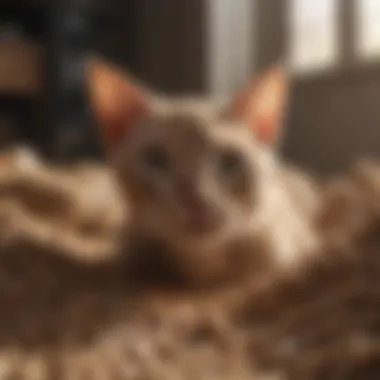
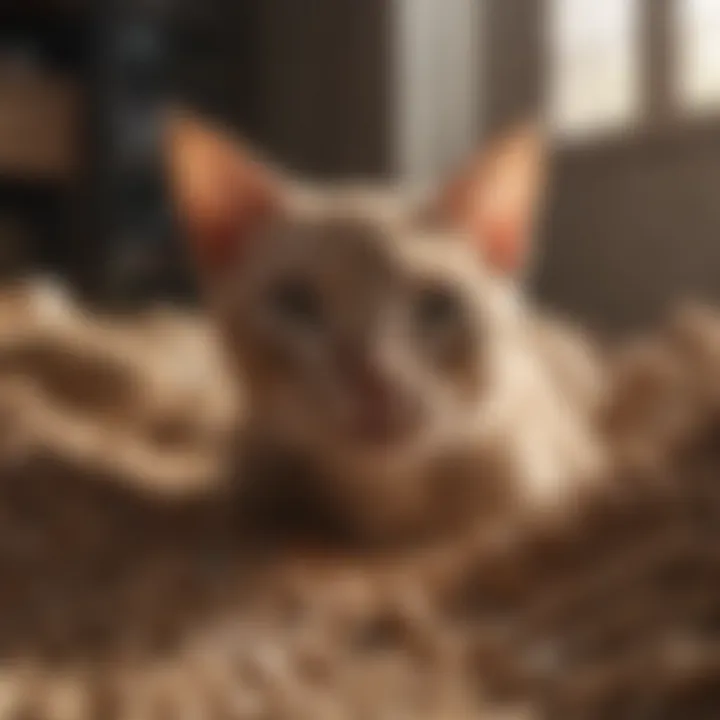
Odor control is essential in any cat litter, especially for Sphynx cats. Their unique skin composition contributes to a higher likelihood of skin oils and dirt being present around their litter box usage. An efficient litter will neutralize odors effectively. Look for products that contain baking soda or natural clumping materials that can absorb and eliminate odors.
Additionally, consider the frequency of changing the litter. Regular cleaning of the litter box is vital to maintaining a pleasant environment for both the cat and the owner. Litter that clumps well also makes it easier to remove waste, which contributes to improved odor control.
Dust Levels
Dust levels in cat litter can pose health risks, particularly for Sphynx cats. These cats tend to have sensitive respiratory systems, and high dust content can aggravate such sensitivities. Selecting a low-dust litter reduces the risk of respiratory issues and helps maintain air quality in the home. Look for litters labeled as
Health Considerations
Understanding health considerations is crucial for selecting the right litter for Sphynx cats. These felines have unique needs due to their hairless skin and distinctive behavior. This section focuses on two primary aspects: allergy risks and health risks from litter ingredients. Addressing these factors ensures not just cleanliness, but also the overall well-being of Sphynx cats.
Allergy Risks
Sphynx cats can be more sensitive to allergens, both in their environment and in the products they use. Certain cat litters contain materials that may trigger allergies or irritations. For example, highly scented litters can lead to respiratory issues.
It is essential for owners to opt for hypoallergenic options. Some litters explicitly state they are free from added fragrances and harsh chemicals.
Here are some tips to minimize the risk of allergies for your Sphynx cat:
- Choose unscented litters: These are less likely to cause sensitivities.
- Monitor reactions: Pay close attention to any changes in behavior after introducing new litters.
- Consider natural products: Biodegradable litters, like those made from corn or wheat, often have fewer additives that can cause problems.
By focusing on hypoallergenic options, owners can safeguard their pets from unnecessary discomfort.
Health Risks from Ingredients
Not all litter materials are created equal. Some are made with substances that may pose health risks to Sphynx cats. For instance, certain clumping agents or chemicals used in traditional clay litters can be harmful.
Common health concerns related to litter ingredients include:
- Toxic additives: Some litters contain chemicals that can be harmful if ingested, especially when the cat grooms themselves.
- Dust exposure: Many litters produce dust that can irritate respiratory systems. Sphynx cats, due to their skin, may have compromised respiratory health.
To select the safest litter:
- Research ingredients: Look for brands that clearly list their components.
- Look for certifications: Some products may be certified as safe or non-toxic.
Choosing proper litter is vital not only for comfort but also for the long-term health of Sphynx cats. Paying attention to allergies and potential risks can help create a safe and comfortable litter box experience.
Sphynx Cats and Litter Box Training
Training a Sphynx cat to use a litter box effectively is of crucial importance. Unlike more conventional breeds, Sphynx cats may require additional considerations due to their unique characteristics. This part of the article will explore traditional and innovative training methods, addressing specific needs that come with their hairless nature. Through understanding their temperament and habits, owners can create a more harmonious living situation while ensuring proper hygiene.
Initial Familiarization
The first encounter a Sphynx cat has with the litter box can be pivotal. Proper familiarization sets the foundation for successful litter box use later. It is important to choose a litter that has a texture and odor that appeals to them. Start by placing the litter box in a calm, accessible area. Cats are creatures of habit, so consistency will support their comfort.
When introducing the litter box:
- Gently place your Sphynx in the box several times a day.
- Praise them after they use it, reinforcing positive behavior.
- Keep the box clean to encourage continued use.
Utilizing unscented litters may help too, as Sphynx cats can be sensitive to strong aromas. Monitor their reactions closely to gauge their comfort. An ideal environment will promote curiosity rather than anxiety.
Maintaining Cleanliness
Cleanliness is pivotal in ensuring that Sphynx cats continue to use their litter boxes without aversion. Regular maintenance prevents odors and bacterial growth, factors that can deter them from using the box. Here are some best practices for maintaining litter box hygiene:
- Scoop daily: Remove any clumps immediately to keep the litter fresh.
- Change litter regularly: Depending on the type of litter used, a complete change every week may be necessary.
- Wash the box: Every month, clean the litter box with soap and water to remove residues and odors.
Maintaining a clean litter box is essential for Sphynx cats, as their hygiene needs are particularly pronounced due to their lack of fur.
Implementing these steps will contribute significantly to your cat’s comfort. A clean environment encourages regular use and shows your Sphynx that their needs are valued. By focusing on initial familiarization and cleanliness, owners can ensure their cats adapt well to their litter boxes, contributing to overall well-being.
Common Issues with Litter Box Use
Understanding common issues related to litter box use is essential for Sphynx cat owners. These issues can impact the comfort and well-being of the pet. Addressing these problems not only helps to maintain hygiene but also fosters a positive relationship between the owner and the cat. Factors such as litter box aversion and environmental attributes are significant considerations in this context.
Litter Box Aversion Causes
Litter box aversion refers to a cat's reluctance to use their litter box. Various causes can contribute to this behavior, and it is crucial to identify them to resolve any issues effectively.
- Litter Type: Sphynx cats, with their unique skin sensitivities, may develop preferences for specific litter textures. A litter that feels uncomfortable can discourage them from using the box.
- Location of the Litter Box: The positioning of the litter box plays a vital role. If the box is in a noisy or high-traffic area, the cat may feel unsafe or stressed when trying to use it.
- Cleanliness: Sphynx cats are naturally clean animals. An unkept litter box is a significant deterrent. Regular maintenance is important to encourage consistent use.
- Health Issues: Sometimes litter box aversion can be a sign of underlying health problems. Issues like urinary tract infections can cause discomfort, leading to avoidance.
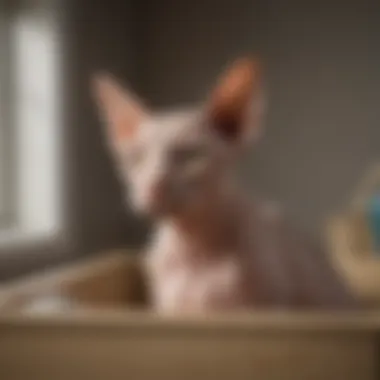
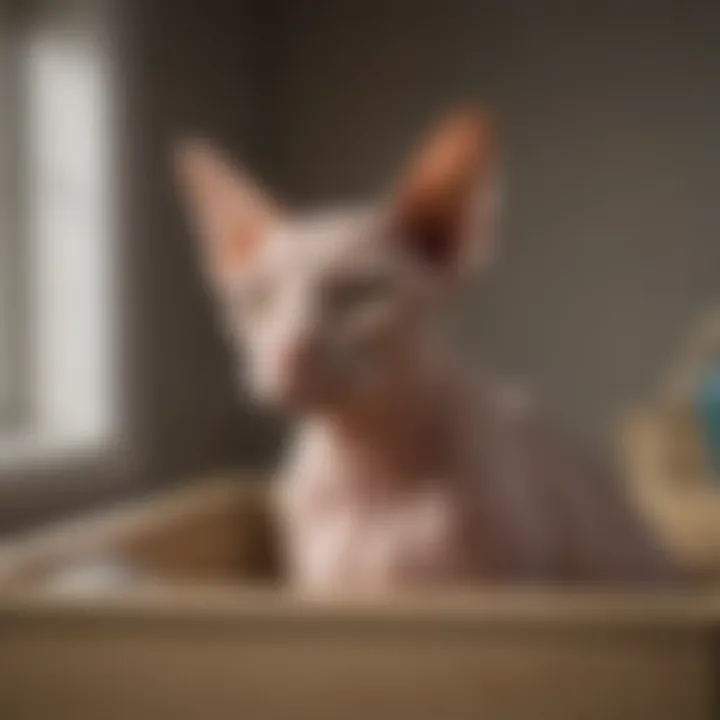
Given these factors, observing the cat's behavior can provide insights into the underlying causes of litter box aversion. Making changes based on this analysis can help restore the cat's comfort.
Environmental Factors
The environment where the litter box is placed significantly affects the cat's willingness to use it. Several factors must be considered:
- Noise Levels: Cats prefer quiet and calm settings. A litter box placed near washing machines or in busy hallways may not be suitable.
- Accessibility: The box should be easily accessible, especially for older or less mobile Sphynx cats. A box that is too high or requires navigating stairs can lead to avoidance.
- Placement Preferences: Some cats have a preference for specific locations, such as secluded corners. Observing the cat's behavior can help determine their preferred placement.
- Multiple Cats: In a multi-cat household, competition and territorial behaviors can lead to reluctance to use the same litter box. Providing multiple boxes can minimize stress.
By addressing these environmental factors, Sphynx cat owners can create a more positive litter box experience for their pets, encouraging regular usage.
Recommendations for Best Cat Litter
Choosing the right litter for Sphynx cats is essential. These hairless felines have unique needs, and the litter plays a significant role in their overall comfort and health. It's vital to consider factors like texture, odor control, and health implications when selecting the optimal litter. In this section, we will explore the best options available, helping Sphynx cat owners make informed decisions.
Top Clumping Litter Options
Clumping litter has gained popularity, and for good reason. The clumping ability allows for easy cleanup, which is crucial for maintaining hygiene in a Sphynx cat's environment. Effective clumping litter not only absorbs moisture but also holds odors, making it an ideal choice.
Key Benefits:
- Easy Maintenance: Clumps can be removed quickly, which is crucial for preventing bacteria growth.
- Odor Control: Many clumping litters contain ingredients that neutralize odors effectively.
- Variety of Materials: Options are available from traditional clay to more eco-friendly options, giving owners choice in texture and formulation.
Popular Choices:
- World's Best Cat Litter: Made from whole-kernel corn, it is biodegradable and offers strong clumping and odor control.
- Tidy Cats Clumping Cat Litter: Known for its reliable performance, it combines clay with odor-absorbing technology.
Best Biodegradable Litter Choices
Biodegradable litters are an excellent choice for environmentally conscious owners. They provide a sustainable option while maintaining efficacy in odor control and absorbency.
Benefits of Biodegradable Options:
- Environmentally Friendly: Made from renewable resources, reducing the carbon footprint.
- Natural Ingredients: Often free from synthetic additives, making them safer for cats with sensitive skin or allergies.
Recommended Brands:
- Ökocat Cat Litter: Made from reclaimed wood, it absorbs moisture effectively and controls odors.
- Nature's Miracle Cat Litter: Made from recycled paper, it is gentle on paws and offers excellent odor control.
Effective Crystal Litter Brands
Crystal litter is another option worth considering. Made from crystalized silica, this type of litter is known for its absorbent properties and low dust production. It is particularly effective for controlling odors and moisture.
Benefits of Crystal Litter:
- Long-lasting: Requires less frequent changing compared to traditional litters.
- Low Dust: Minimizes respiratory irritants, suitable for Sphynx cats with potential sensitivities.
Brands to Explore:
- PetFusion Crystal Cat Litter: Known for its clump-free design and excellent odor control.
- SILICA cat Litter: A budget-friendly option that absorbs moisture efficiently.
When selecting the right cat litter for Sphynx cats, consider their unique needs, health implications, and your environmental impact. By focusing on quality options, you can enhance the overall litter box experience for both you and your feline friend.
User Reviews and Experiences
Feedback on Clumping Litters
Clumping litters are often favored by many pet owners due to their ability to form solid clumps when wet. This quality makes cleaning easier and ensures the litter box can be maintained with minimal effort. However, Sphynx cat owners have specific requirements that can influence their choice of litter.
Many users report satisfaction with brands such as Tidy Cats and Arm & Hammer for their effective clumping action and odor control. However, some feedback indicates that certain clumping litters can create excessive dust, which may irritate the sensitive skin of Sphynx cats. Therefore, it is essential to select a product labeled as low-dust or dust-free. Additionally, users recommend avoiding heavily scented clumping litters as they can pose a risk of allergic reactions or discomfort.
Overall, the anecdotal evidence surrounding clumping litters plays a crucial role in understanding their appropriateness for Sphynx cats. Many owners emphasize the intended balance between ease of cleaning and the well-being of their pets.
Insights on Biodegradable Options
Biodegradable litter options, such as those made from corn, wheat, or recycled paper, are increasingly popular among environmentally conscious cat owners. Many Sphynx cat owners have shared their experiences about these products as alternatives to traditional clay litters.
Users highlight the benefits of biodegradable litters in terms of odor control and the absence of harmful chemicals. Brands like World's Best Cat Litter and Swheat Scoop are often mentioned for their natural composition. According to user experiences, biodegradable litters generally provide a softer texture, which aligns well with the Sphynx cat's delicate condition.
Nonetheless, there are considerations to be mindful of with biodegradable options. Some users note that these litters may not clump as effectively as their clay counterparts, which can lead to increased cleanup efforts. Others suggest trying different brands until finding a suitable product that addresses both performance and the cat’s comfort.
End
Selecting the appropriate litter for Sphynx cats holds considerable significance. Given their unique skin composition and behavioral traits, Sphynx cats require specific litter types that cater to both comfort and hygiene. This article discusses the unique needs of Sphynx owners regarding litter box preferences and litter type, which is pertinent to ensuring optimal care for these hairless felines.
Summary of Key Points
- Skin Sensitivity: Sphynx cats often experience sensitivity in their skin, making it vital to choose litter that minimizes irritation.
- Texture Preference: A focus on texture is important. Sphynx cats can be picky, and ensuring that the litter feels comfortable under their paws is crucial for their acceptance of the litter box.
- Type of Litter: Various litter types, such as clumping clay, biodegradable, and crystal litters, have unique advantages and disadvantages that cater to the specific requirements of Sphynx cats.
- Health Considerations: Dust and allergens in litter can pose health risks. Choosing low-dust options can enhance their well-being and comfort.
- Maintaining Cleanliness: Regular scooping and deep cleaning are non-negotiable for maintaining a healthy environment that aligns with the standards required for Sphynx cats.







